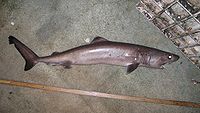Portal:Sharks/Selected articles/9
The crocodile shark, Pseudocarcharias kamoharai, is a species of shark found worldwide in tropical waters. It is the only member of the family Pseudocarcharidae. The crocodile shark is the smallest living mackerel shark, measuring only 1 m (3 ft) long, and can be distinguished by its elongated body, extremely large eyes, and relatively small fins. It is a specialized inhabitant of the open ocean, feeding on pelagic fishes and invertebrates. The size and structure of its eyes indicates that it is adapted for hunting at night. The crocodile shark is ovoviviparous and typically gives birth to litters of four. The fetuses are oophagous, meaning that they feed on eggs produced by the mother. Due to its small size, the crocodile shark is of little commercial importance. However, it is caught in substantial numbers as bycatch, leading it to be assessed as Near Threatened by the World Conservation Union. This species was responsible for damaging deep sea fiberoptic cables when the technology was first deployed in 1985.

